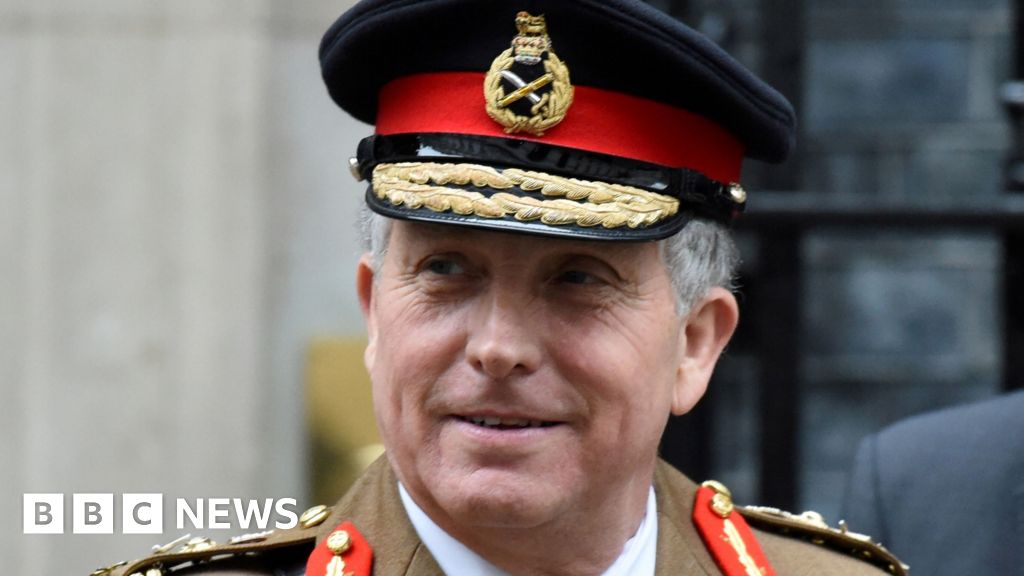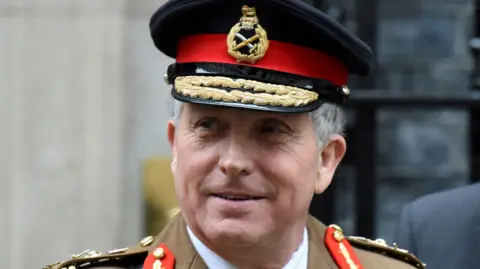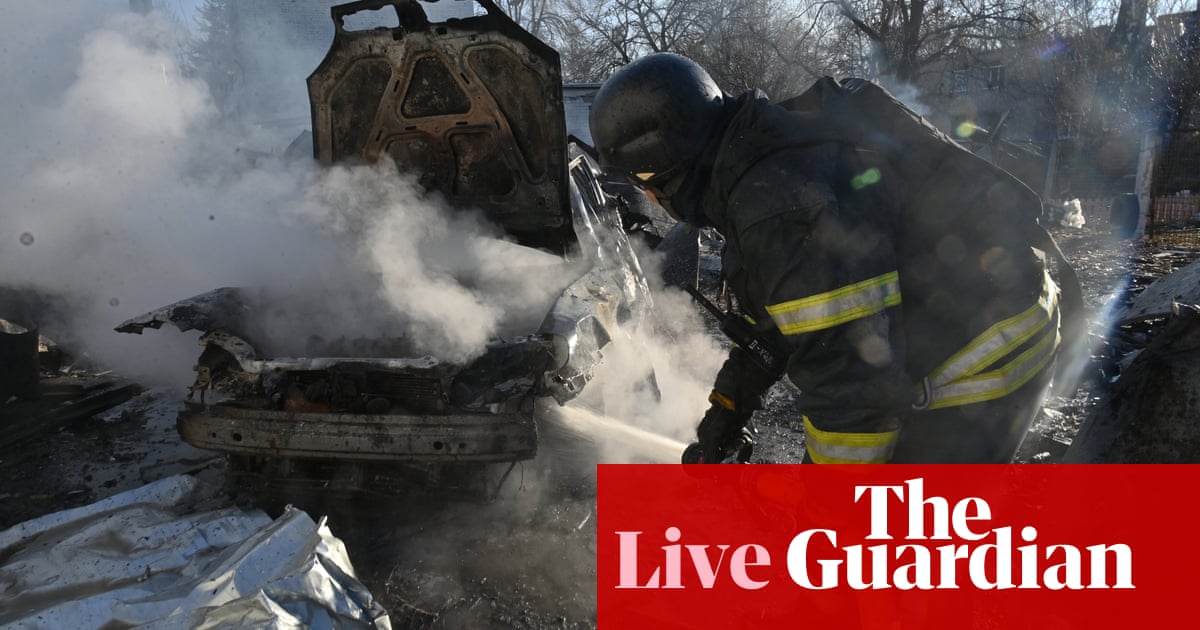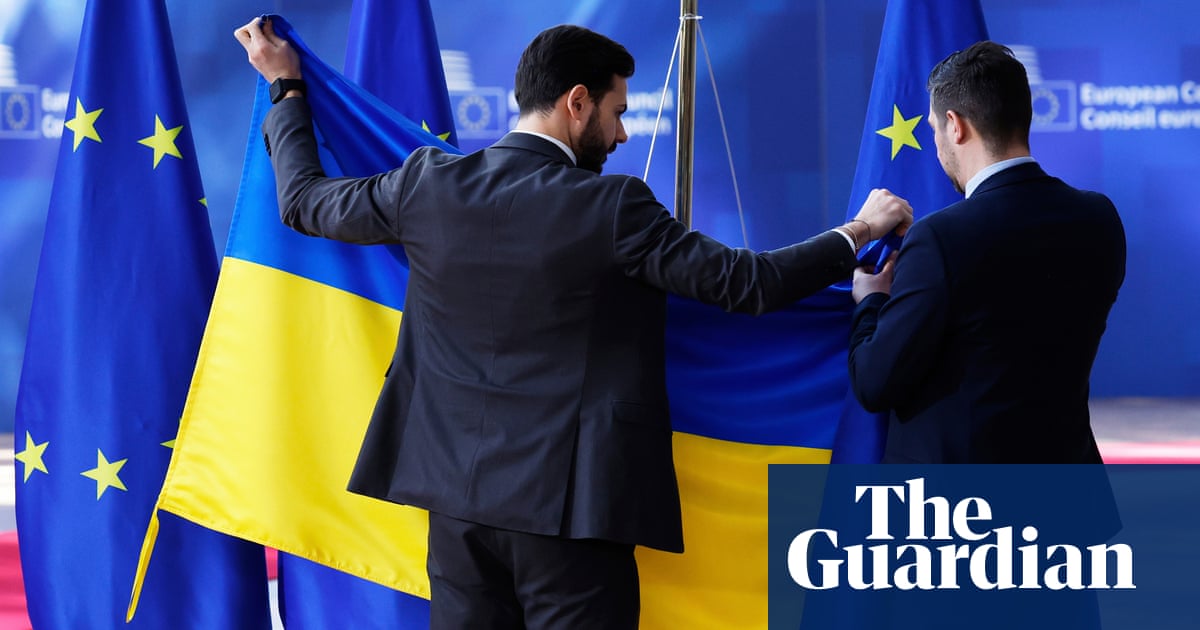Ex-Army head says UK and Europe must step up over Ukraine

 Getty Images
Getty ImagesThe UK and Europe may need to offer security guarantees to Ukraine in the event of a peace deal with Russia, regardless of US support, the former head of the British armed forces has said on a BBC One Question Time special.
Retired General Sir Nick Carter said he believed it was for Ukraine to decide what a “fair settlement” meant, but that the UK and European countries needed to “step up to the plate” to guarantee Ukraine’s sovereignty “if the Americans are not prepared to do that”.
Earlier this week, Prime Minister Sir Keir Starmer said a “US security guarantee was the only way to effectively deter Russia”.
Foreign Secretary David Lammy has said the UK is “ready to listen” to Russia – if it is serious about peace and “rejects Tsarist imperialism”.
The rift between Ukrainian President Volodymyr Zelensky and US President Donald Trump has appeared to deepen in recent days, with America announcing it will soon begin direct negotiations with Russia.
Sir Keir said the UK was willing to provide peacekeeping troops if necessary, but a US “backstop” would be needed to keep the peace and stop Russia attacking again.
He did not explain what he meant by this but others have suggested it could involve air support, logistics and intelligence capabilities.
Trump said earlier this week that he “would not object” to Europe sending in peacekeeping troops, but the US “won’t have to put any over there, because, you know, we’re very far away”.
The prime minister is due to visit Washington next week for talks with the US president at which he is expected to maintain his support for Zelensky and Ukraine’s government while seeking to gain Trump’s ear over talks with Russia.
According to the White House, Sir Keir will visit on Thursday, following a separate visit by French President Emmanuel Macron to see Trump on Monday. There was no confirmation from Downing Street of the date of Sir Keir’s visit.
Macron is seeking to co-ordinate a European response and said he had spoken to Zelensky to discuss the diplomatic situation ahead of his trip.
Canadian Prime Minister Justin Trudeau also spoke to Zelensky, repeating Canada’s support and stressing that Kyiv must be involved in any negotiations to end the war.
China has come out in support of Trump’s plan to negotiate with Russia, with Foreign Minister Wang Yi saying it supports “all efforts conducive to peace” including the US-Russia talks.
“China has noted that calls for peace talks have been rising recently, and a window for peace is opening,” Wang was quoted as saying at the G20 meeting in South Africa by AFP news agency.
The US president has called Zelensky a “dictator” and suggested Ukraine was responsible for the full-scale Russian invasion in February 2022, saying a peace deal could have been struck earlier.
The Ukrainian leader said the US president was “living in a disinformation space” created by Moscow.
Washington has also suggested Europe needs to take greater responsibility for its own defence.
Sir Nick, who was chief of the UK’s defence staff between 2018 and 2021, said he thought the UK and other European allies had “got to state a position”.
“I think that fundamentally there has got to be some form of guarantee of Ukraine’s sovereignty in the future,” he said.
He warned the UK armed forces were “remarkably hollow” after a “process of neglect over a 30-year period”.
“I think we also need to be clear about how vulnerable our country is,” he said, describing how much of the UK’s critical infrastructure was dependent on undersea cables or not “not properly protected by cyber defences”.
He said: “We are in a position I think where we are massively vulnerable at the moment. And whether we like it or not that means we’re going to have to start protecting ourselves.
“And the sort of onslaught that Ukraine has suffered from the air via drones and missiles over the course of the last three years is unsustainable as far as the UK’s concerned.
“We might be able to park a destroyer in the Thames to protect parts of London but nothing more than that.”
The G20 – or Group of Twenty – is a club of countries that meets to discuss global economic and political issues.
Attending the talks in Johannesburg, Lammy appeared sceptical of whether Moscow was serious about peace, after listening to his Russian counterpart Sergei Lavrov’s speech.
“We’ve not got anywhere near a negotiated settlement, and I have to say when I listened to what the Russians and what Lavrov has just said in the chamber this afternoon, I don’t see an appetite to really get to that peace,” Lammy said.
Lammy and Lavrov both gave speeches behind closed doors at the summit.
It is understood Lavrov boycotted Lammy’s speech, in which he said the UK was “ready to listen” to Russia but they expeced to hear more than Russian President Vladimir Putin’s “tired fabrications”.
Thursday’s Question Time panel included Sir Nick; Ukrainian MP Lesia Vasylenko, a member of the liberal, pro-European opposition Holos party; Jan Halper-Hayes, who has served as a campaign adviser to Trump; Cabinet Office minister Nick Thomas-Symonds; and Conservative former defence secretary Sir Ben Wallace.
Ukrainian refugees among the audience spoke about the trauma of seeing their country torn apart by war.
Related
Zelenskyy reiterates call for air truce after huge Russian attack…
We need Russia to stop attacks, Zelenskyy says, backing calls for truce in air, at seaUkrainian president Volodymyr Zelenskyy has responded to overnight attacks
Europe scrambles to rearm as Trump threatens security guarantees and…
CNN — European leaders have vowed to rearm the continent at historic emergency talks h
Russia launches ‘massive’ attack on Ukraine after Europe rushes to…
Ukraine's energy and gas infrastructure came "under massive missile and drone shelling" by Russia on Friday, a Ukrainian minister said."The energy and gas infra
American severance may be averted, but Europe’s leaders must fear…
With a mixture of regret, laced with incredulity, European leaders gathered in Brussels to marshal their forces for a power struggle not with Russia, but with t












